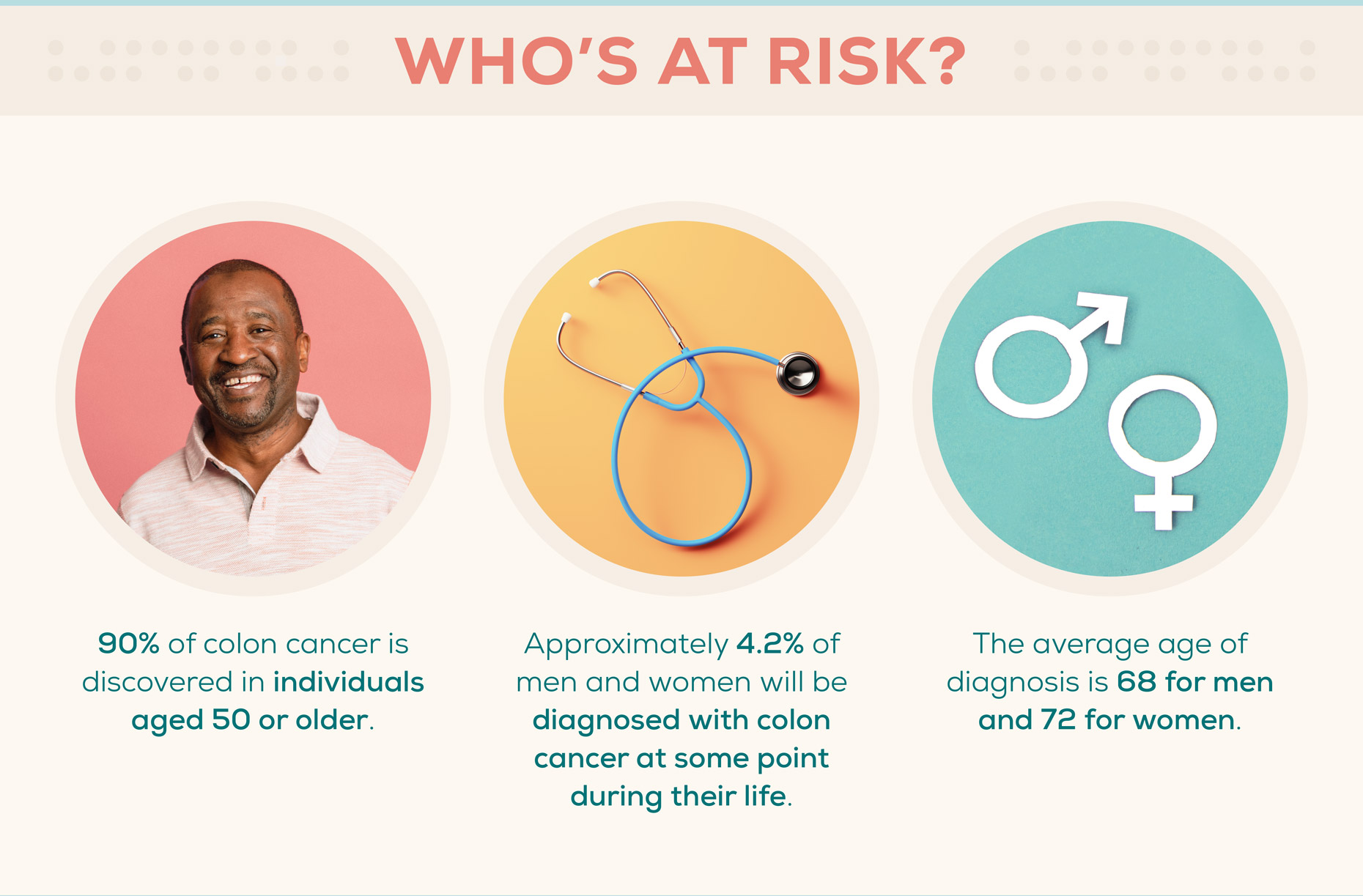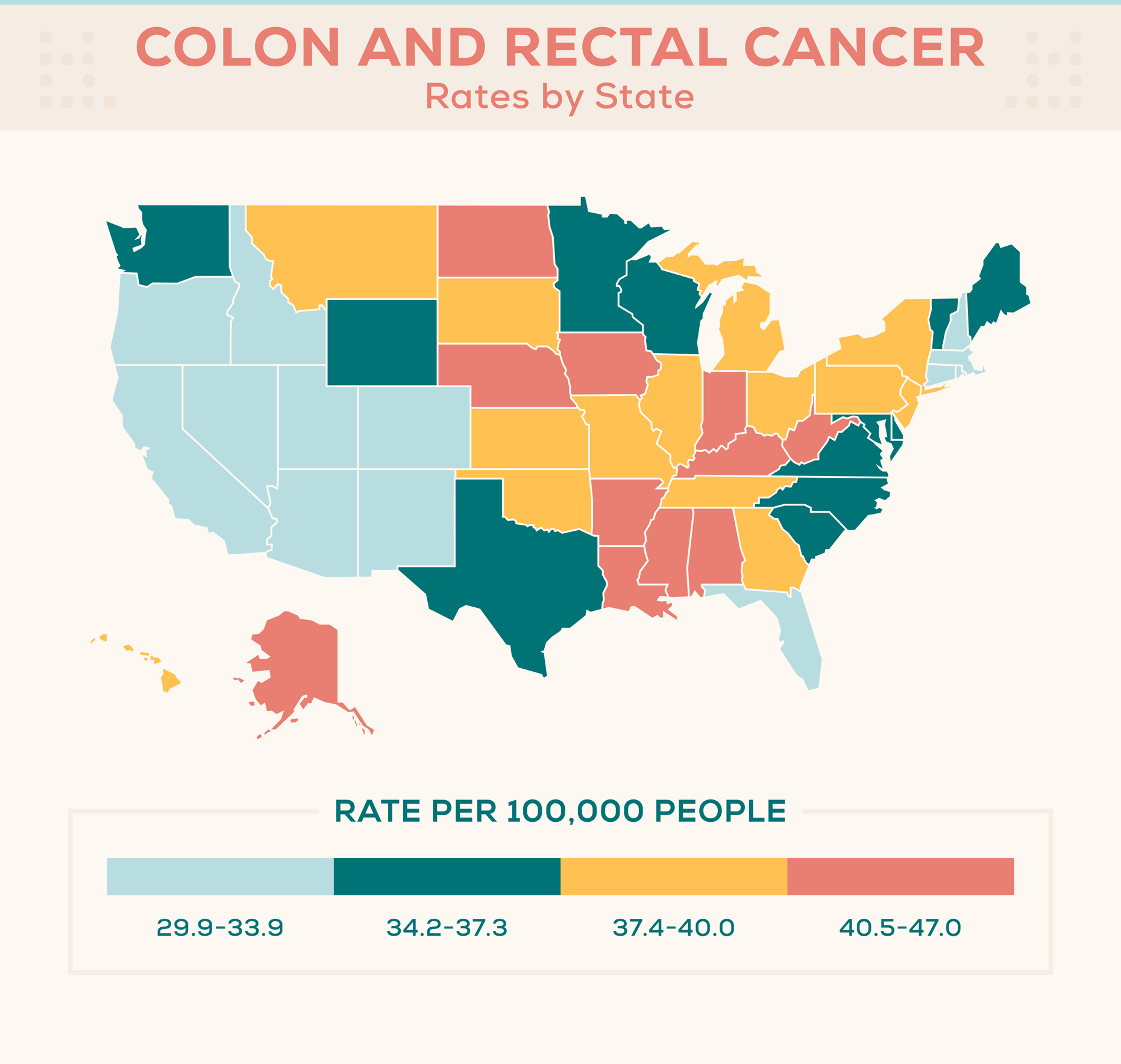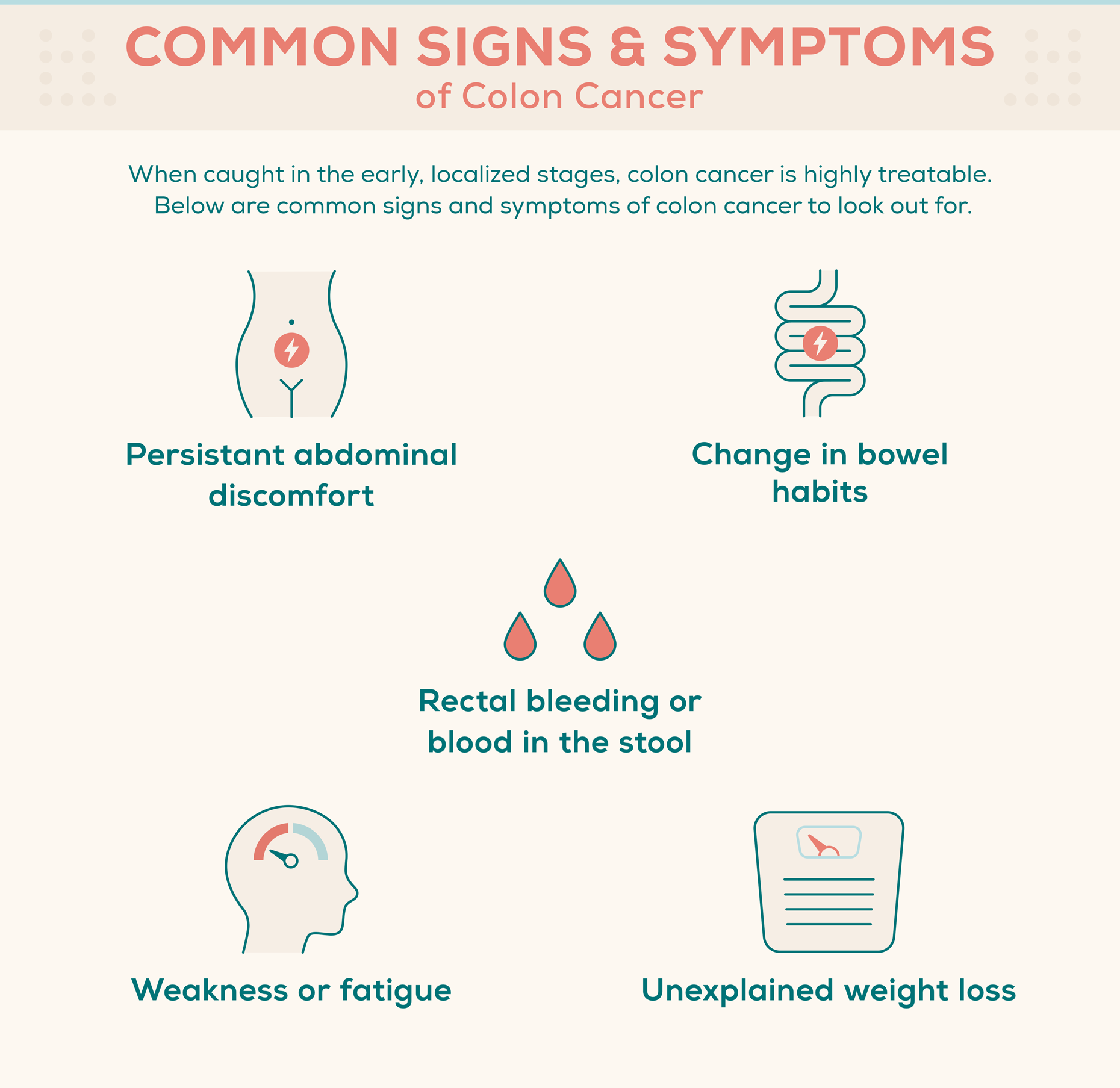
Colon Cancer Statistics to Know in 2024: Risk Factors, Diagnosis, and Survival Rate
Updated March 12, 2024. Medically reviewed on Oct 22, 2022 by Jordan Stachel, M.S., RDN, CPT. To give you technically accurate, evidence-based information, content published on the Everlywell blog is reviewed by credentialed professionals with expertise in medical and bioscience fields.
Colorectal cancer is cancer that occurs in the colon or rectum and is sometimes referred to as colon cancer or CRC for short. Colorectal cancer is the third most common cancer diagnosed in both men and women in the United States. [1]
Despite it being the third leading cause of cancer-related deaths, the death rate from colon cancer continues to drop. [1] This can likely be attributed to an increased emphasis on screening and early detection, as well as advances in cancer care and treatment. On average, the 5 year survival rate for localized and regional colon cancer are 90% and 74%, respectively. [2]
While anyone can develop colon cancer, it’s most commonly seen in adults over the age of 50. [3] Reducing your risk of colon cancer, and increasing your likelihood of survival if affected, starts with early detection and education.
Table of Contents:
Colorectal Cancer Risk Factors
So, who is at risk for colon cancer? A person’s family history, ethnicity, and age can put them at higher risk for colon cancer. While anyone can get colon cancer, it’s most common among Black individuals, those over the age of 50, and people assigned male at birth (AMAB). [3]Accordingly, the risk of developing colon cancer can depend on such factors as age, sex, race, and lifestyle choices.
Colon Cancer Statistics by Age
According to the American Society of Clinical Oncology, the average age for men and people AMAB to be diagnosed with colon cancer is 66. For women and people assigned female at birth (AFAB), the age is 69. [4]
Further, 90% of colorectal cancer cases are found in individuals aged 50 or older. [5]
Interestingly, in recent years, the incidence rate for colorectal cancer diagnosis decreased by about 3.6% in adults over the age of 55. However, the opposite was observed in colon cancer rates among young adults or those below the age of 55: incidence rates increased by 2%, likely due to increases in rectal cancer diagnoses. However, more research is required to fully understand the trend. [4]
Colon Cancer Statistics by Sex
Colorectal cancer is strongly influenced by sex and, potentially, gender. That said, sex and gender are not the same. Sex refers to an individual’s reproductive biology, and gender speaks to that person’s chosen sexual identity. [6] For the purpose of this discussion, we’ll be referring to sex.Past research has shown that people AMAB are more likely to develop colorectal cancer, with people AMAB twice as likely to die from the disease, compared to people AFAB. [6] People AMAB are also more likely to consume larger quantities of red and processed meat, as well as alcohol, compared to people AFAB. Further, people AMAB typically have higher amounts of visceral fat, which can increase one’s risk of developing colorectal cancer. [7]
The American Cancer Society estimates the following case numbers in 2024 [1]:
- Colon cancer: 54,210 in men and 52,380 in women
- Rectal cancer: 27,330 in men and 18,890 in women
That said, it’s important to note that female patients have been historically underrepresented in colorectal cancer research. A recent study that investigated this discrepancy found that certain risk factors associated with colon cancer in men do not always translate to female bodies. [6]
For example, while a proinflammatory diet can increase a man’s colorectal cancer risk, the same was not observed in female patients. Further, consuming soy may lower the risk of developing colorectal cancer in women, but the same is not true in men. [6]
With all that said, the lifetime risk of developing colorectal cancer is about 4.3% in men and 4% in women each year. [1] In 2023, the National Cancer Institute observed that the rate of new cases of colorectal cancer is about 36.6 per 100,000 men and women per year, with the mortality rate being 13.1 per 100,000 men and women per year. [8]
Colon Cancer Statistics by Race and Ethnicity
Studies have found that there is a significant disparity in colon cancer rates among racial and ethnic groups. Specifically, Black Americans have a 20% higher incidence of colorectal cancer, compared to White Americans. Further, Black Americans are also more likely to [9]:- Develop this disease as younger adults
- Experience late diagnosis
- Die of the disease
A 2021 report found that the CRC incidence rate in Black Americans is 41.9 per 100,000, compared to 37.0 per 100,000 in White Americans. Native Americans are the second highest at-risk population, with colorectal cancer incidences at 39.3 per 100,000. [10]
The same trends continue in terms of colorectal cancer death rates [10]:
- Black Americans: 16.8 per 100,000
- Native Americans: 14.0 per 100,000
- White Americans: 12.9 per 100,000

Diagnosis
A cancer’s stage is critical for determining treatment options and assessing prognosis. Those who are able to identify colorectal cancer sooner can reduce the risk of cancer cells spreading to different areas of the body, and can increase their chance of recovery.
Regular screening is essential for early detection, but it’s also important to pay attention to your body. If you experience unusual symptoms such as bleeding from the rectum, abdominal discomfort, blood in the stool, dark or black stools, or any change in bowel habits, it is recommended you see your healthcare provider.
In 2023, it was observed that there were 153,020 new cases of colon cancer, compared to 147,950 in 2020. [8]
People with a first-degree relative, such as a parent, sibling, or child, who have had colorectal cancer are also more likely to develop this type of cancer compared to those without a family history. Specifically, one study found that about 8.4% of people who had colorectal cancer had a family member with a polyp, while only 5.7% of people who didn't have colorectal cancer had a family member with a polyp. [11]
The American Cancer Society 2020-2022 Colorectal Facts and Figures Sheet shares the following diagnostic health statistics [12]:
- 39% of colorectal cancer patients are diagnosed with localized-stage disease, which means the cancer has grown into the wall of the colon or rectum but has not invaded nearby tissue.
- 35% of colorectal cancer patients are diagnosed with regional-stage disease, which indicates that the cancer has spread beyond the wall of the colon or rectum and has invaded nearby tissue or spread to lymph nodes.
- 21% of colorectal cancer patients are diagnosed with distant-stage disease, meaning the cancer has spread to other parts of the body, such as the liver or lungs.
Survival
Colorectal cancer accounts for 8.6% of all cancer deaths. [8]
Fortunately, treatment for colorectal cancer has advanced over the past several decades due to improvements in imaging, surgical colorectal surgery techniques, and chemotherapy. That said, thousands of people are still affected by colon cancer each year—in 2023, it was estimated that 153,020 people were diagnosed with colorectal cancer, and 52,550 related deaths were estimated to have occurred. [13] In 2024, it’s expected to cause 53,010 deaths. [1]
That said, treatment outcomes are influenced by tumor characteristics and stage at diagnosis. With this in mind, it’s best to get screened regularly for colon cancer, as this can help identify precancerous polyp (abnormal growth) in the colon or rectum or find colorectal cancer early when treatment may be more successful.
The relative 5 year survival rate—the percentage of people who will be alive 5 years after diagnosis not including those who die from other diseases—is 65%. [8]
The five-year relative colon cancer survival rates for each type of colon cancer are as follows [2]:
- Localized colon cancer: 91%
- Regional colon cancer: 73%
- Distant colon cancer: 13%
Colon Cancer Screening
Regular screening starting at age 50 is key for colorectal cancer prevention. [3] However, you may need to begin screening earlier if you have a family history of colon cancer or have an inflammatory bowel disease such as Crohn’s disease or ulcerative colitis.
When caught in the early localized stage, colorectal cancer is highly treatable. That said, regular colonoscopies are essential for early detection, treatment, and recovery. [3]
The percentage of individuals (ages 50 to 75) in the U.S. who are up-to-date with colorectal screening continues to increase over the years. As of 2020, 72% of people between the ages of 50 to 75 were screened for colorectal cancer. [14] Of these numbers, racial and ethnic percentages up to date on screenings include [14]:
- American Indian and Alaskan Native: 62%
- Asian: 61%
- Black or African American: 75%
- Hispanic/Latino: 64%
- Native Hawaiian and Other Pacific Islander: 70%
- White: 74%
Stay On Top of Your Health with Everlywell
Regular screening is important for early detection and increasing your chance of recovery, should you be diagnosed with colon cancer. If you have a family history of colorectal cancer, you're over the age of 50, or you’re experiencing signs or symptoms, screening for colon cancer is an easy way to test for the presence of blood in your stool, which can help detect colon cancer early on.
Fortunately, Everlywell’s at-home Colon Cancer Test can get you the information you need discreetly and conveniently. We can even connect you to a qualified telehealth professional to walk through your results with you.
If you have any questions or concerns, talk to your healthcare provider about your average risk for colon cancer and what screening method may be best for you.
Sources
- Key Statistics for Colorectal Cancer. American Cancer Society. Medical Citation URL. Accessed February 21, 2024.
- Survival Rates for Colorectal Cancer. American Cancer Society. Medical Citation URL. Accessed February 21, 2024.
- Colon Cancer. Cleveland Clinic. Medical Citation URL. Accessed February 21, 2024.
- Colorectal Cancer: Risk Factors and Prevention. Cancer. Medical Citation URL. Accessed February 21, 2024.
- What Are the Risk Factors for Colorectal Cancer? CDC. Medical Citation URL. Accessed February 21, 2024.
- Baraibar I, et al. Sex and gender perspectives in colorectal cancer. ESMO Open. Medical Citation URL. Accessed February 21, 2024.
- White A, et al. A review of sex-related differences in colorectal cancer incidence, screening uptake, routes to diagnosis, cancer stage and survival in the UK. BMC Cancer. Medical Citation URL. Accessed February 21, 2024.
- Cancer Stat Facts: Colorectal Cancer. NIH. Medical Citation URL. Accessed February 21, 2024.
- Chan A. Racial disparities and early-onset colorectal cancer: A call to action. Harvard Health Publishing. Medical Citation URL. Accessed February 21, 2024.
- Carethers J. Racial and Ethnic Disparities in Colorectal Cancer Incidence and Mortality. Adv Cancer Res. Medical Citation URL. Accessed February 21, 2024.
- Song M, et al. Risk of colorectal cancer in first degree relatives of patients with colorectal polyps: nationwide case-control study in Sweden. BMJ. Medical Citation URL. Accessed February 21, 2024.
- Colorectal Cancer Facts & Figures 2020-2022. American Cancer Society. Medical Citation URL. Accessed February 21, 2024.
- Colorectal Cancer: Statistics. Cancer. Medical Citation URL. Accessed February 21, 2024.
- Use of Colorectal Cancer Screening Tests. CDC. Medical Citation URL. Accessed February 21, 2024.
Jordan Stachel, M.S., RDN, CPT is most fulfilled when guiding others towards making stepwise, sustainable changes that add up to big results over time. Jordan works with a wide variety of individuals, ranging in age from children to the elderly, with an assortment of concerns and clinical conditions, and has written for publications such as Innerbody. She helps individuals optimize overall health and/or manage disease states using personalized medical nutrition therapy techniques.
